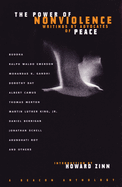 The Arundhati Roy excerpt War is Peace is from her .from ‘s 2002 book Power Politics. It form the twenty-second chapter in The Power of Nonviolence: Writings by Advocates of Peace. This essay continues the Post-Vietnam to the Present (1975- ) section of the book. Roy is an activist and Man Booker Prize winning author. Though, the preceding essays in this book all deal with timeless themes in supporting pacifism, this essay, which centers on the US invasion of Afghanistan in 2001, is the first essay in the book to feel that it is based on contemporary world politics.
The Arundhati Roy excerpt War is Peace is from her .from ‘s 2002 book Power Politics. It form the twenty-second chapter in The Power of Nonviolence: Writings by Advocates of Peace. This essay continues the Post-Vietnam to the Present (1975- ) section of the book. Roy is an activist and Man Booker Prize winning author. Though, the preceding essays in this book all deal with timeless themes in supporting pacifism, this essay, which centers on the US invasion of Afghanistan in 2001, is the first essay in the book to feel that it is based on contemporary world politics.
Roy starts the essay with the gamification {the process of turning war into a video game] of the October 7, 2001 US-led attack on Afghanistan. The attack was done without seeking UN approval or even under color of international law. Inverting the expected criticism against her comments, Roy makes clear that she does not take the side of any entity that chooses violence: Continue reading Roy: Afghan War based on DoubleSpeak





